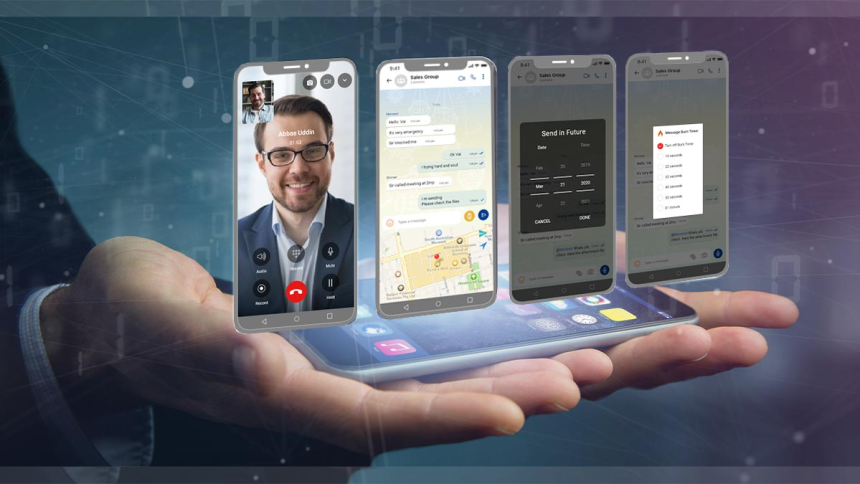The shift to remote work has prompted organizations to rethink how they approach communication. As businesses continue to embrace virtual collaboration, one technology that’s been gaining momentum is softphones. These software-based alternatives to traditional phones are revolutionizing how remote teams stay connected. By offering a wide range of benefits, softphones are becoming an essential tool for businesses looking to optimize their communication strategies in the digital age.
What is a Softphone?
A softphone is a software application that allows users to make voice calls over the internet using their computers or smartphones, bypassing the need for traditional landline or mobile phone services. It functions like a regular phone, but instead of a physical device, it operates via the internet, using VoIP (Voice over Internet Protocol) technology. This makes it particularly well-suited for remote workers who need flexible, cost-effective solutions to stay in touch with colleagues and clients.
Benefits of Softphones for Remote Teams
One of the primary advantages of softphones is their flexibility. They can be used from virtually anywhere, as long as there’s an internet connection. This makes them a perfect fit for remote teams who need to stay in constant communication regardless of their location. Whether you’re working from home, a coffee shop, or a coworking space, softphones ensure you never miss an important call.
Another significant benefit is cost savings. Traditional phone systems often come with hefty installation and maintenance fees, especially for businesses with a large number of employees. Softphones, however, reduce these costs by eliminating the need for expensive hardware and relying on internet connections rather than phone lines. This makes them a highly cost-effective solution for businesses of all sizes.
Seamless Integration with Other Tools
Softphones don’t operate in isolation. One of the key reasons why they’re transforming communication is their ability to seamlessly integrate with other business tools. Many softphone platforms offer integrations with email, calendars, CRM systems, and team collaboration tools like Slack or Microsoft Teams. This allows remote teams to have a unified communication system that enhances efficiency and streamlines workflows.
For instance, with a softphone integrated into your CRM, you can automatically log calls and track customer interactions without needing to manually enter data. This integration not only saves time but also improves productivity by reducing the need to switch between different platforms.
Enhanced Call Features for Remote Work
Softphones come equipped with a wide range of features that go beyond simple voice calls. Remote teams can benefit from video conferencing, voicemail transcription, call forwarding, and even screen sharing. These features make communication smoother and more versatile, helping teams collaborate in real-time without missing a beat.
For example, video conferencing has become a staple for remote teams, and most softphone solutions now include this feature as part of their core offering. This allows for face-to-face meetings and virtual team huddles, ensuring that collaboration remains strong despite physical distance. Additionally, call forwarding allows remote employees to seamlessly take calls on their smartphones or computers, ensuring that no call goes unanswered.
Improved Security for Remote Workers
As businesses continue to adapt to remote work, cybersecurity is a growing concern. Softphones provide enhanced security features that help protect sensitive communications. Many softphone solutions offer end-to-end encryption, ensuring that calls are secure and private. This is especially important for industries dealing with confidential information, such as finance or healthcare.
Furthermore, because softphones are cloud-based, businesses can easily implement security protocols such as two-factor authentication and access controls to ensure that only authorized personnel can use the system. This level of security is a significant advantage for remote teams that need to maintain confidentiality and safeguard their data.
Scalability and Customization
As businesses grow, their communication needs evolve. Softphones offer scalability that traditional phone systems simply cannot match. Whether you’re hiring new employees or expanding into new markets, softphone platforms can easily accommodate these changes without requiring major upgrades or additional hardware.
Most softphone providers offer customizable plans that can be tailored to fit a company’s specific needs. This flexibility ensures that businesses only pay for the features they use, and they can easily scale up or down as needed. This adaptability makes softphones a smart choice for businesses looking to stay agile in an ever-changing work environment.
The Future of Remote Work Communication
The ongoing shift towards remote and hybrid work models shows no signs of slowing down. As remote teams continue to become the norm, softphones will likely play an even more central role in how businesses communicate. With their flexibility, cost-effectiveness, and integration capabilities, softphones offer a powerful solution for businesses looking to improve their communication strategies.
In the coming years, we can expect further advancements in softphone technology, such as AI-powered features, improved voice recognition, and even more robust integration with emerging business tools. As companies continue to invest in remote work infrastructure, softphones will undoubtedly remain a key component in shaping the future of work.
Building a Better Future
Softphones are transforming how remote teams communicate, offering a flexible, cost-effective, and secure alternative to traditional phone systems. By providing a wide range of features and seamless integration with other business tools, softphones are helping businesses streamline communication, improve productivity, and stay connected across distances. As remote work continues to grow, the role of softphones will only become more integral to the future of business communication.
Lynn Martelli is an editor at Readability. She received her MFA in Creative Writing from Antioch University and has worked as an editor for over 10 years. Lynn has edited a wide variety of books, including fiction, non-fiction, memoirs, and more. In her free time, Lynn enjoys reading, writing, and spending time with her family and friends.















